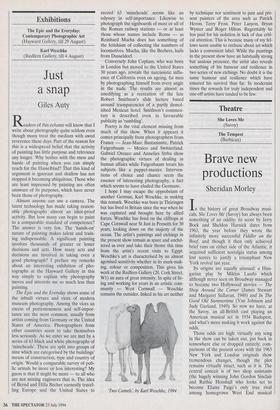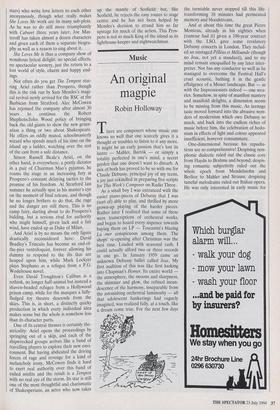Theatre
She Loves Me (Savoy) The Tempest (Barbican)
Brave new productions
Sheridan Morley
In the history of great Broadway musi- cals, She Loves Me (Savoy) has always been something of an oddity: its score by Jerry Bock and Sheldon Harnick dates from 1963, the year before they wrote the infinitely more successful Fiddler on the Roof, and though it then only achieved brief runs on either side of the Atlantic, it acquired sufficient nostalgia status among lost scores to justify a triumphant New York revival last year.
Its origins are equally unusual: a Hun- garian play by Mildos Laszlo which although never seen on Broadway managed to become two Hollywood movies — The Shop Around the Corner (James Stewart and Margaret Sullavan, 1940) and In The Good Old Summertime (Van Johnson and Judy Garland, 1949). So now we have, at the Savoy, an all-British cast playing an American musical set in 1934 Budapest, and what's more making it work against the odds.
Those odds are high: virtually any song in the show can be taken out, put back in somewhere else or dropped entirely; com- parisons of the present score with the 1963 New York and London originals show tremendous changes, though the plot remains virtually intact, such as it is. The central conceit is of two shop assistants (the hugely winning John Gordon Sinclair and Ruthie Henshall who looks set to become Elaine Paige's only true rival among homegrown West End musical
stars) who write love letters to each other anonymously, though what really makes She Loves Me work are its many sub-plots. As he was to do still more triumphantly with Cabaret three years later, Joe Mas- teroff has taken almost a dozen characters and given each of them a separate biogra- phy as well as a reason to sing about it.
She Loves Me is thus a company show of wondrous lyrical delight: no special effects, no spectacular scenery, just the return to a lost world of style, charm and happy end- ings.
Not often do you get The Tempest star- ring Ariel rather than Prospero, though this is the risk run by Sam Mendes's magi- cal revival newly arrived for the RSC at the Barbican from Stratford. Alec McCowen has rejoined the company after almost 30 years to continue the Robert Shephens/John Wood policy of bringing back the old giants to show the new gener- ation a thing or two about Shakespeare. He offers an oddly muted, schoolmasterly wizard who spends much of his time on the island up a ladder, watching over the rest of the cast from a safe distance.
Simon Russell Beale's Ariel, on the other hand, is everywhere: a portly dictator in a pair of Chairman Mao's pyjamas, he roams the stage in an increasing fury at Prospero's constant delaying tactics to the promise of his freedom. At Stratford last summer he actually spat in his master's eye on the moment of final release, and though he no longer bothers to do that, the rage and the danger are still there. This is no camp fairy, darting about to do Prospero's bidding, but a serious rival for authority who might himself, given luck and a fair wind, have ended up as Duke of Milan.
And ,Ariel is by no means the only figure drastically reconsidered here: David Bradley's Trinculo has become an end-of- the-pier ventriloquist, forever allowing his dummy to respond to the ills that are heaped upon him, while Mark Locicyer plays Stephano as a refugee from a P.G. Wodehouse novel.
Even David Troughton's Caliban is a rethink, no longer half-animal but instead a shaven-headed refugee from a Hollywood prison camp, while for the masques a fully- fledged toy theatre descends from the skies. This is, in short, a distinctly quirky production in which every individual idea makes sense but the whole is somehow less than its character parts. One of its central themes is certainly the- atricality: Ariel opens the proceedings by Springing out of a skip, and each of the shipwrecked groups arrives like a band of travelling players to explore their new envi- ronment. But having abdicated the driving forces of rage and revenge for a kind of melancholy irony, McCowen finds it hard to exert real authority over this band of
exiled misfits and the result is a Tempest with no real eye of the storm. Its star is still
one of the most thoughtful and charismatic of Shakesperians, an actor who now takes up the mantle of Scofield: but, like Scofield, he rejects the easy routes to stage centre and he has not been helped by Mendes's decision to strand him so far upstage for much of the action. This Pros- pero is not so much King of the island as its lighthouse-keeper and nightwatchman.



















































 Previous page
Previous page